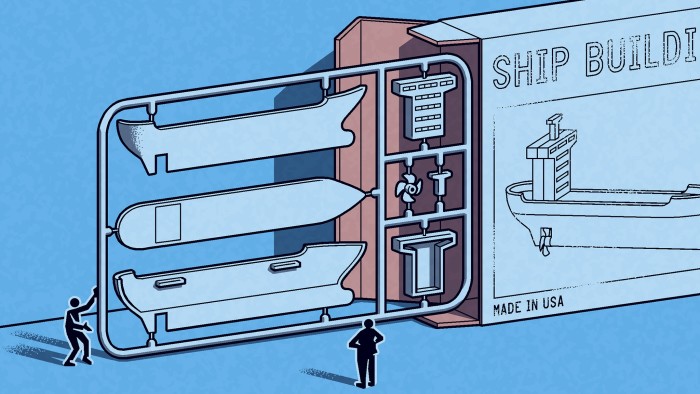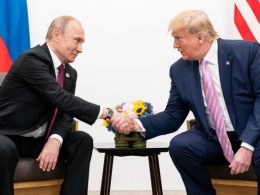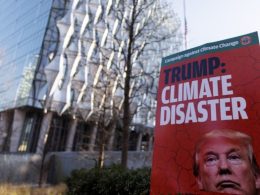Unlock the White House Watch newsletter for free
Your guide to what the 2024 US election means for Washington and the world
The first Trump administration reversed America’s stance on global trade. Joe Biden then doubled down on Donald Trump’s tariffs, while adding industrial policy to the mix. Now his parting gift to Trump is a new trade verdict that argues for US government support for the maritime, logistics and shipbuilding sectors in the face of Chinese competition. It will be the first big test of whether Trump’s second term will be focused on the economic desires of his base, or the “tech-industrial complex” decried by Biden in his parting speech.
The timing is no accident. The investigation, issued by the US trade representative under Section 301 of the Trade Act, lays out how China has used non-market practices to dominate the global maritime industry. While Biden has supported pushing back against such practices, not everyone in the Democratic party has been eager to make the shift. By releasing the case four days before Trump’s inauguration, the departing administration has made sure it didn’t get derailed by Democrats who would prefer to tip-toe away from the issue of Chinese mercantilism. It also threw down a gauntlet for Trump. Will tariffs be his only tool? Or will he support industrial policy and US workers in more effective and durable ways?
Whether or not you support Section 301 action, it’s tough to read the case and argue that China’s behaviour in shipbuilding isn’t discriminatory. There are the usual problems, like massive state loans and access to non-market excess capacity in raw materials. Then there are the distortions in the Chinese labour market that make it nearly impossible for market economies to compete in the maritime sector, where China now has a market share of more than 50 per cent.
One of the most interesting sections of the report dives deep into the hukou system. In this, Chinese citizens are classified as rural or urban residents, and can’t receive state benefits such as education, housing, or healthcare outside the jurisdiction in which they were born. Since many rural residents migrate to coastal areas to work, the result is that half of the population resides in urban areas, but only a third have an urban classification.
That has a hugely distorting effect on Chinese and global labour markets. As one scholar quoted in the report notes, the hukou system creates a “huge class of super-exploitable, yet highly mobile or flexible industrial workers for China’s new economy, now closely integrated into global trade networks”. It is essentially a massive state transfer from labour to the owners of capital, which is one of the reasons why Chinese economists concerned about bolstering domestic consumption would like to get rid of it (hukou reform is happening, though not as fast as many would like).
It’s also one of many ways in which China’s system is incompatible with the Bretton Woods trading system as it exists today. “There’s no question that China’s very different economic model makes it difficult to have a system of globalisation based on WTO rules,” notes economist and Nobel laureate Michael Spence. Indeed, that’s the reason that Biden’s trade representative, Katherine Tai, pushed (albeit unsuccessfully) for a new model of trade based on setting a floor, rather than a ceiling, on environmental and labour standards.
Trump certainly won’t care much about the former, but politically, he will need to care about the latter. The fractures between the Maga base and billionaire class populating the top ranks of his administration are already showing. If he chooses not to take on the shipbuilding support recommendations left by his predecessor, unions and Maga hardliners alike will pitch a fit, which could sow major discontent in his first 100 days.
But I’m betting that the Trump administration will take up the issue, and perhaps even offer up more vigorous support than Democrats might have done. Trump loves bright shiny objects, and nothing is brighter and shinier than a new aircraft carrier.
More importantly, there are legitimate national security and commercial supply chain reasons to build more non-Chinese maritime capacity. Nearly half of US goods and 80 per cent of global trade is transported by ship. China can significantly influence the pricing and availability of ships given its share of the market. It’s hard to imagine that this power wouldn’t be weaponised in the event of any US-China conflict. Trump has already suggested the US build ships with allies like South Korea.
Of course, increasing maritime capacity is a long-term, heavy lift. And yet, the success of the Chips Act, which has rebooted US semiconductor production in less than two and a half years, shows that it is possible to create more resiliency and redundancy in critical industries when there is political will. The question is whether Trump will have any. Slapping tariffs on adversaries and allies alike is much easier than actually crafting a multifaceted industrial policy.
That said, the political pull towards it will be pressing. Much of the Biden administration’s stimulus went into red states. The Chips Act is supporting construction of new semiconductor plants in Ohio, Texas and Arizona, all of which voted for Trump. The bipartisan Ships Act introduced last month provides a road map for maritime industrial policy. Whether Trump follows it will say much about the direction of his second term.
Source link









